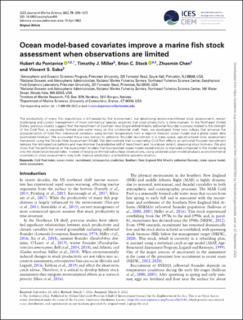| dc.contributor.author | Du Pontavice, Hubert | |
| dc.contributor.author | Miller, Timothy J. | |
| dc.contributor.author | Stock, Brian | |
| dc.contributor.author | Chen, Zhuomin | |
| dc.contributor.author | Saba, Vincent S. | |
| dc.date.accessioned | 2022-09-28T12:35:46Z | |
| dc.date.available | 2022-09-28T12:35:46Z | |
| dc.date.created | 2022-09-23T13:24:18Z | |
| dc.date.issued | 2022 | |
| dc.identifier.citation | ICES Journal of Marine Science. 2022, 79 (4), 1259-1273. | en_US |
| dc.identifier.issn | 1054-3139 | |
| dc.identifier.uri | https://hdl.handle.net/11250/3022271 | |
| dc.description.abstract | The productivity of many fish populations is influenced by the environment, but developing environment-linked stock assessments remain challenging and current management of most commercial species assumes that stock productivity is time-invariant. In the Northeast United States, previous studies suggest that the recruitment of Southern New England-Mid Atlantic yellowtail flounder is closely related to the strength of the Cold Pool, a seasonally formed cold water mass on the continental shelf. Here, we developed three new indices that enhance the characterization of Cold Pool interannual variations using bottom temperature from a regional hindcast ocean model and a global ocean data assimilated hindcast. We associated these new indices to yellowtail flounder recruitment in a state–space, age-structured stock assessment framework using the Woods Hole Assessment Model. We demonstrate that incorporating Cold Pool effects on yellowtail flounder recruitment reduces the retrospective patterns and may improve the predictive skill of recruitment and, to a lesser extent, spawning stock biomass. We also show that the performance of the assessment models that incorporated ocean model-based indices is improved compared to the model using only the observation-based index. Instead of relying on limited subsurface observations, using validated ocean model products as environmental covariates in stock assessments may both improve predictions and facilitate operationalization. | en_US |
| dc.language.iso | eng | en_US |
| dc.title | Ocean model-based covariates improve a marine fish stock assessment when observations are limited | en_US |
| dc.title.alternative | Ocean model-based covariates improve a marine fish stock assessment when observations are limited | en_US |
| dc.type | Peer reviewed | en_US |
| dc.type | Journal article | en_US |
| dc.description.version | publishedVersion | en_US |
| dc.source.pagenumber | 1259-1273 | en_US |
| dc.source.volume | 79 | en_US |
| dc.source.journal | ICES Journal of Marine Science | en_US |
| dc.source.issue | 4 | en_US |
| dc.identifier.doi | 10.1093/icesjms/fsac050 | |
| dc.identifier.cristin | 2054837 | |
| cristin.ispublished | true | |
| cristin.fulltext | original | |
| cristin.qualitycode | 2 | |
